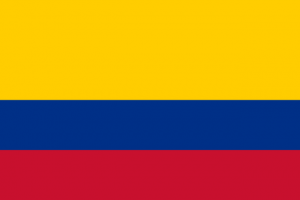Difference between revisions of "Language/Spanish/Culture/Colombia-Timeline"
(Created page with "<div style="font-size: 270%"> Historical Timeline for Colombia - A chronology of key events</div> <div style="float:right"> <center> File:Colombia-Timeline-PolyglotClub.png|...") |
|||
| Line 8: | Line 8: | ||
{{Timeline-world}} | {{Timeline-world}} | ||
</div> | </div> | ||
<div style="font-size: 270%"> Historical Timeline for Colombia - A chronology of key events</div> | |||
<div style="float:right"> | |||
<center> | |||
[[File:Colombia-Timeline-PolyglotClub.png|thumb|none]] | |||
---- | |||
</center> | |||
{{Timeline-world}} | |||
</div> | |||
Before the Spanish conquest ➡ Colombian territory was populated by indigenous Chibchas and the Caribbean. | |||
1499-1500 ➡ Discovery of Colombia by Alonso de Ojeda. | |||
1525 ➡ Foundation of Santa Marta, by Rodrigo de Bastidas. | |||
1538 ➡ Foundation of Santa Fé de Bogotá by Gonzalo Jiménez de Quesada. | |||
1580-1820 ➡ Period of the Colony. | |||
1783 ➡ Establishment of the Expédición Botánica, led by the Spanish naturalist and priest José Celestino Mutis. | |||
1794 ➡ Impression of Human Rights by Antonio Nariño, precursor of independence. | |||
1818 ➡ Proclamation of the new Kingdom of Granada. | |||
December 17, 1819 ➡ Bolívar proclaims Greater Colombia (grouping together Ecuador, Venezuela and New Granada). | |||
1830 ➡ Proclamation of the Republic of New Granada. Death of Simón Bolívar in Santa Marta. | |||
1863 ➡ Establishment of a federal system. Independence of the nine states forming Colombia. Beginning of civil wars. | |||
1886 ➡ New constitution, under the presidency of Rafael Núñez. | |||
1899-1902 ➡ War of the Thousand Days between liberals and conservatives. Over 100,000 dead. | |||
1903 ➡ Independence of Panama from Colombia. | |||
1934-1938 ➡ Liberal President Alfonso López Pumarejo grants a series of social rights. | |||
1948 ➡ Assassination of liberal leader Jorge Eliécer Gaitán and start of the period of Violencia. | |||
1948-1957 ➡ New civil war between liberals and conservatives. | |||
1953-1957 ➡ Dictatorship of General Gustavo Rojas Pinilla. | |||
1960 ➡ Appearance of the first guerrillas. | |||
1991 ➡ New constitution. | |||
1993 ➡ Death of Pablo Escobar, marking the end of the big drug cartels. | |||
1994 ➡ Ernesto Samper Pizano is the new head of state. | |||
1998 ➡ Election of Andrés Pastrana Arango. | |||
2002 ➡ Presidency of Alvaro Uribe, reelected in 2006. | |||
2008 ➡ Death of the historic leader of the FARC, Manuel Marulanda Vélez. | |||
July 2, 2008 ➡ Ingrid Betancourt, hostage of the FARC, is freed by the Colombian army. | |||
May 2010 ➡ Election to the presidency of Juan Manuel Santos. | |||
June 2011 ➡ Adoption of the law on victims of the Colombian conflict. | |||
October 2012 ➡ Beginning of peace negotiations in Oslo between Santos and the FARC. | |||
June 2014 ➡ Juan Manuel Santos is reelected. | |||
September 2016 ➡ Historic peace agreement signed with the FARC. | |||
October 2016 ➡ Rejection of the agreement during the referendum; Nobel Peace Prize awarded to Santos. | |||
December 2016 ➡ The new peace agreement is ratified by Congress. | |||
March 31, 2017 ➡ Mudslides cause the death of 323 people in Mocoa. | |||
June 2017 ➡ Total disarmament of the FARC. | |||
September 2017 ➡ The FARC transform into a political party. Visit of Pope Francis. | |||
Revision as of 12:48, 10 December 2021
Before the Spanish conquest ➡ Colombian territory was populated by indigenous Chibchas and the Caribbean.
1499-1500 ➡ Discovery of Colombia by Alonso de Ojeda.
1525 ➡ Foundation of Santa Marta, by Rodrigo de Bastidas.
1538 ➡ Foundation of Santa Fé de Bogotá by Gonzalo Jiménez de Quesada.
1580-1820 ➡ Period of the Colony.
1783 ➡ Establishment of the Expédición Botánica, led by the Spanish naturalist and priest José Celestino Mutis.
1794 ➡ Impression of Human Rights by Antonio Nariño, precursor of independence.
1818 ➡ Proclamation of the new Kingdom of Granada.
December 17, 1819 ➡ Bolívar proclaims Greater Colombia (grouping together Ecuador, Venezuela and New Granada).
1830 ➡ Proclamation of the Republic of New Granada. Death of Simón Bolívar in Santa Marta.
1863 ➡ Establishment of a federal system. Independence of the nine states forming Colombia. Beginning of civil wars.
1886 ➡ New constitution, under the presidency of Rafael Núñez.
1899-1902 ➡ War of the Thousand Days between liberals and conservatives. Over 100,000 dead.
1903 ➡ Independence of Panama from Colombia.
1934-1938 ➡ Liberal President Alfonso López Pumarejo grants a series of social rights.
1948 ➡ Assassination of liberal leader Jorge Eliécer Gaitán and start of the period of Violencia.
1948-1957 ➡ New civil war between liberals and conservatives.
1953-1957 ➡ Dictatorship of General Gustavo Rojas Pinilla.
1960 ➡ Appearance of the first guerrillas.
1991 ➡ New constitution.
1993 ➡ Death of Pablo Escobar, marking the end of the big drug cartels.
1994 ➡ Ernesto Samper Pizano is the new head of state.
1998 ➡ Election of Andrés Pastrana Arango.
2002 ➡ Presidency of Alvaro Uribe, reelected in 2006.
2008 ➡ Death of the historic leader of the FARC, Manuel Marulanda Vélez.
July 2, 2008 ➡ Ingrid Betancourt, hostage of the FARC, is freed by the Colombian army.
May 2010 ➡ Election to the presidency of Juan Manuel Santos.
June 2011 ➡ Adoption of the law on victims of the Colombian conflict.
October 2012 ➡ Beginning of peace negotiations in Oslo between Santos and the FARC.
June 2014 ➡ Juan Manuel Santos is reelected.
September 2016 ➡ Historic peace agreement signed with the FARC.
October 2016 ➡ Rejection of the agreement during the referendum; Nobel Peace Prize awarded to Santos.
December 2016 ➡ The new peace agreement is ratified by Congress.
March 31, 2017 ➡ Mudslides cause the death of 323 people in Mocoa.
June 2017 ➡ Total disarmament of the FARC.
September 2017 ➡ The FARC transform into a political party. Visit of Pope Francis.
